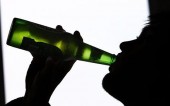Alcohol Isn’t the Answer for Depression
It’s cocktail season. And that means millions will drink too much, including people who suffer from depression.
While having a drink can relieve anxiety—at least temporarily—abuse of alcohol can make us even more depressed. And though pop culture paints a decidedly different picture, alcohol is actually a depressant. It’s not a stimulant.
Drinking Alcohol and Depression: Adding Fuel to the Fire

The first time I quit drinking alcohol, I was severely depressed. Ignorant about mental illness, I was taken aback when my psychiatrist told me to cut out alcohol. Entirely. It’s fuel to the fire for those who suffer from depression, she insisted.
Total abstinence from alcohol may or may not be what everyone who suffers from depression needs. I am not qualified to make that judgment. I can say from my personal experience that alcohol was a terribly ineffective means of self-medication, with some serious side effects to boot. Like more anxiety. And more depression.
My wife helped me to see the error of my ways and the dangers of my past alcohol abuse. Fortunately, despite some serious binge drinking days, I had a relatively “high low,” to put it in AA parlance. I never got arrested, beaten up, or a DUI. I was lucky.
Admittedly, cutting back and then quitting drinking entirely has not fixed all of my problems. Not by a long shot. So why not just say to heck with it and party with the rest of the world? Because I know what alcohol abuse leads to for me. It makes me more depressed. Hangovers that dog “normal” people for a day send me into a three-day tailspin.
So is it possible for depressed people to drink responsibly? I’m sure it is for some. That’s not for me to judge or to diagnose. I can only say that alcohol isn’t the answer for me.
HealthyPlace has some really good resources about alcohol and abuse, including this one on risk factors for an alcohol or drug relapse that can help you determine if you have a problem. I would encourage you to check it out, along with HealthyPlace’s great addiction blogger who knows more about the subject than I do.
Happy New Year. Raise your glasses, just be careful about turning it up, especially if you may be suffering from depression.
APA Reference
Smith, J.
(2011, December 30). Alcohol Isn’t the Answer for Depression, HealthyPlace. Retrieved
on 2026, March 3 from https://www.healthyplace.com/blogs/copingwithdepression/2011/12/alcohol-isnt-the-answer-for-depression
Author: Jack Smith
Alcohol is slow suicide for a really severe depressed person, it is a case of the "f" it's, it is saying to yourself, I am in too much pain so now I will do whatever it takes to get relief as I am in too much pain to care about my life now OR down the road, today I am undone. Today I need to stop the pain, today I need to sleep, today I need to kill the anxiety, today I need to be blotto.
When you decide you really do want to live, instead of not being sure dying wouldn't be a bad solution (sitting on the fence but leaning to I can't do better), you finally realize you want to stop abusing alcohol. It takes luck, love, patience, God, doctors, family, no one thing will pull you out. And yes, this is from personal experience with my own depression and divorce which was the end of my world at the time.
Now I am sober, non-smoking, and looking forward. I have horse therapy (my horse is down the road and she is big enough to handle my physical and mental pain). Whenever I am within 6 feet of her I feel no depression nor any physical pain, my 2 biggest problems in my life. Pet therapy. Amazing.
I don't question it. All I know is how much it helps me.
Part of the problem with alcohol is it gives you a quick dose of dopamine (a feel good hormone) and then it's followed by a sharp crash. Then they feel like they just need more to keep the good feelings going. That same happens with drugs. This is part of the addictive process. When people have healthier sources of dopamine like healthy relationships, exercise, and doing things that line up with their values they have less of an urge to go the unhealthy sources of dopamine like drugs, alcohol, sweet and salty foods, and pain.
Agree from direct personal and sordid experience with allou say and of course the guilt shame etc of booze just adds to the spiral downwards. Drinking is arguably one of the worst self-medications a depressive can adopt, arguably more destructive than heroin :(